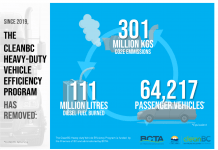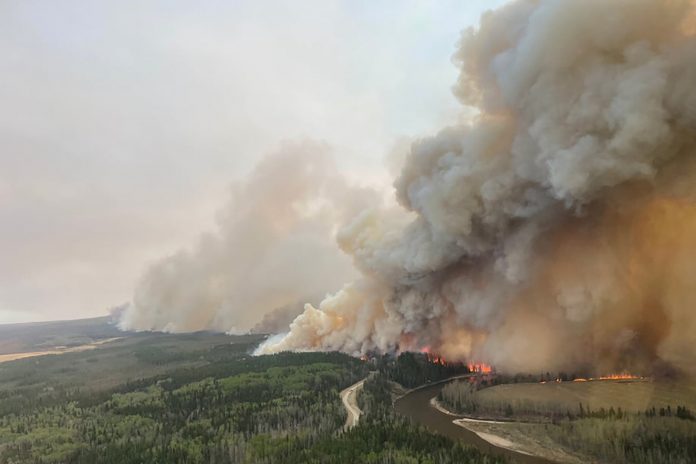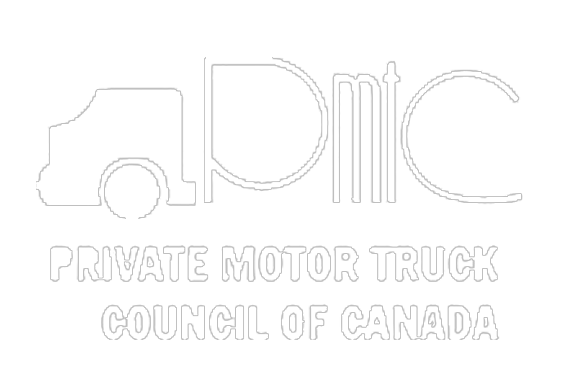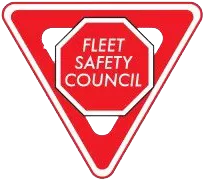Pollution from Forest Fires Affects Truck Performance
Forest fires add particulate matter to the air and impact the health of individuals. The
accompanying air pollution can impede vehicle performance, especially if air filters are
not checked regularly for blockage.
With predictions for a busier-than-normal fire season across Canada and the U.S.,
transport carriers should consider updating their air filter programs.
Last week wildfire smoke from Quebec covered much of Ontario, Quebec and south to the U.S. States. Wildfires are burning in B.C. Alberta and Nova Scotia, and the season is early. Current June projections indicate the potential for continued higher-than-normal fire activity across most of the country throughout the 2023 wildland fire season due to ongoing drought and long-range forecasts for warm temperatures. During July, wildfire potential is expected to expand into Yukon. However, the eastern edge will recede from western Quebec into central Ontario.
Some employers required workers to stay home last week. Unfortunately, some weren’t so lucky. Many truck and van drivers had to keep doing their work while driving through smoke, haze and orange-coloured skies.
No specific laws in Canada require employers to protect their workers from dangerous
air. California, on the other hand, has laws requiring companies to provide protective
gear for workers who are “exposed to wildfire smoke” or when “the Air Quality Index (current AQI) for Particulate Matter (PM) 2.5 is 151 or greater. “Similar laws are in Oregon and Washington State.
According to the Centres of Disease Control, PM2.5 is particulate matter that is two-and-a-half microns or less in width, which is small enough to be deeply inhaled and “irritate the lungs, cause inflammation, alter immune functions and increase susceptibility to respiratory infections, likely including COVID-19.”
The CDC suggests using an N95 respirator to help reduce the risks associated with
inhaling harmful wildfire smoke.
Cabin air filters in trucks and other vehicles can also help lower exposure. Mack and Ram responded to the Canadian wildfire inquiry with specific details on cabin filter performance.
The Pure Mack cabin air filter is designed to remove up to 98% of particles, including those “finer than a human hair”. It contains an activated carbon layer to prevent unpleasant odours and harmful gasses such as hydrocarbons, sulfur dioxide, nitrogen oxides and ozone from entering the cab.
The Ram Clean Air System introduced for the model year 2022 trucks and vans “filters out 95% of airborne particulates,” including “pollen, allergens and bacteria.”
Currently, only luxury automakers offer High-Efficiency Particulate Air (HEPA) filters. According to the EPA, HEPA filters “theoretically remove at least 99.97% of dust, pollen, mould, bacteria, and any airborne particles with a size of 0.3 microns.”
It is recommended to step up maintenance for whatever air filtration system your vehicle has when exposed to additional particulates like those found in wildfire smoke. Cabin air filters are easily forgotten and infrequently replaced.
“Absolutely, cabin air filters should be checked/changed more frequently,” according to Dr Jeffrey Siegel, professor of Civil Engineering at the University of Toronto. “HEPA filters are a little more complicated. I am not sure that the systems in trucks can accommodate them, and there can be a balance between a high-efficiency filter like a HEPA and reducing airflow in some systems.”
To help maintain healthy air in the cabin, Siegel recommends the following:
Use the highest efficiency filter and run the system in recirculation mode.
Check/change the filter frequently.
Wear a well-fitted respirator-type mask (e.g., N95) whenever you are outside and consider wearing it while driving too.
Consider a plug-in HEPA filter. Given the small cabin space, it doesn’t need a high clean air delivery rate (CADR). Some models are intended for vehicles (e.g., 12-volt systems) but avoid ion generators and other unproven air-cleaning technologies.
Look at the air quality report in planning your route/stopping points.
Siegel also included that while using a respirator and HEPA filter is good advice for
everyone, it’s “critical for anyone who has respiratory or other health issues that are made worse by air pollution.”
When Mount St. Helen erupted in 1980, near Portland, Oregon, volcanic ash was spread over several states. This quickly caused the failure of engine air filters. While particulates from the Canadian wildfires are not as large, they most definitely can still shorten the life of air filters.
“If there’s a lot of particulate matter, I'm sure it will have a shortened life of air filters. It will reduce your fuel economy and horsepower if you get it plugged enough.” So says, said Randy Allen, service engineer at Baldwin Filters. He recommended keeping closer tabs on the air filter. “On a Class 8 truck, they should have restriction gauges to tell them when they’re plugged,” he said.
A Cummins heavy-duty market engineer said an engine will not experience performance issues in areas with higher PM levels so long as sound maintenance practices are maintained. That also applies to locales with excessive dust kicked up by high winds or from driving along dirt roads.
Preventative maintenance is the overriding rule.
Air filter longevity, truck performance and driver's health all depend on air quality and the amount of PM in the air. Air filters will require more frequent maintenance checks and or replacement. The efficiency of truck engines depends on clean air filters, which will need more frequent replacement under conditions of poorer air quality.
Take caution; pollution from fires decreases the performance of air filters, truck engines and the health and safety of workers in those areas. We should take heed; the experts are warning of a summer of increased fire activity all across Canada.






















